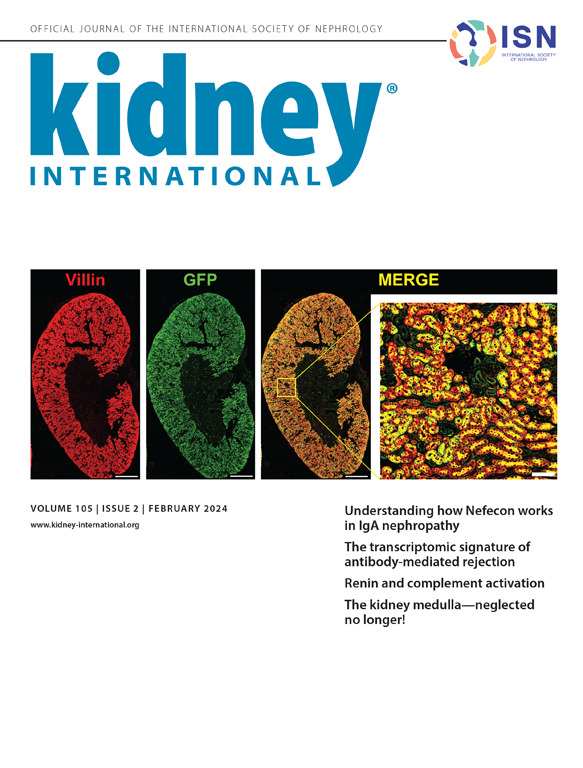Macrophages mediate acute kidney allograft rejection via a toll-like receptor 4-dependent mechanism.
IF 12.6
1区 医学
Q1 UROLOGY & NEPHROLOGY
引用次数: 0
Abstract
INTRODUCTION Macrophages play an important role in acute renal allograft rejection (RAR). Here we report that macrophages mediate acute RAR via a toll-like receptor 4 (TLR4)-dependent mechanism. METHODS Acute RAR was induced in myeloid cell-specific TLR4 knockout mice. Rejection severity was assessed by Banff scores, kidney immune cell infiltration/activation, and kidney function. Mechanisms were investigated using single cell RNA sequencing (scRNA-seq) and pharmacological hypoxia-inducible factor (HIF)1α inhibition. Immune profiling evaluated macrophage polarization, antigen presentation and T cell subsets. RESULTS Disruption of myeloid TLR4 largely suppressed acute RAR, evidenced by lower Banff scores, inhibited kidney immune cell infiltration and activation, and preserved kidney function. scRNA-seq identified HIF1Α as a key downstream target of myeloid TLR4. Importantly, both genetic TLR4 ablation and pharmacological HIF1α inhibition attenuated acute RAR via reducing proinflammatory macrophages (F4/80+ iNOS+ and F4/80+ HIF1α+), suppressing antigen presenting by F4/80+MHCII+ macrophages and modulating T cell immunity by suppressing CD8+ T cells and Th1 cells, while expanding regulatory T cell and Th2 populations. Notably, targeting TLR4/HIF1α signaling also ameliorated fibrosis in long-term allograft rejection. CONCLUSIONS Macrophages mediate acute RAR via a TLR4/HIF1α-dependent mechanism. Targeting TLR4/HIF1α signaling may be a novel therapeutic strategy for acute RAR, with additional benefits mitigating chronic allograft injury.巨噬细胞通过toll样受体4依赖机制介导急性肾移植排斥反应。
巨噬细胞在急性肾移植排斥反应(RAR)中起重要作用。在这里,我们报道了巨噬细胞通过toll样受体4 (TLR4)依赖机制介导急性RAR。方法在髓细胞特异性TLR4敲除小鼠中诱导急性RAR。通过Banff评分、肾免疫细胞浸润/活化和肾功能评估排斥反应严重程度。通过单细胞RNA测序(scRNA-seq)和药物缺氧诱导因子(HIF)1α抑制来研究其机制。免疫谱分析评估巨噬细胞极化、抗原呈递和T细胞亚群。结果破坏髓系TLR4在很大程度上抑制了急性RAR,降低了Banff评分,抑制了肾免疫细胞的浸润和活化,保留了肾功能。scRNA-seq鉴定出HIF1Α是髓系TLR4的一个关键下游靶点。重要的是,基因TLR4消融和药物HIF1α抑制均通过减少促炎巨噬细胞(F4/80+ iNOS+和F4/80+ HIF1α+)、抑制F4/80+MHCII+巨噬细胞呈递抗原和通过抑制CD8+ T细胞和Th1细胞调节T细胞免疫来减轻急性RAR,同时扩大调节性T细胞和Th2群体。值得注意的是,靶向TLR4/HIF1α信号也可以改善长期同种异体移植排斥反应中的纤维化。结论巨噬细胞通过TLR4/ hif1 α依赖机制介导急性RAR。靶向TLR4/HIF1α信号可能是急性RAR的一种新的治疗策略,具有减轻慢性同种异体移植物损伤的额外益处。
本文章由计算机程序翻译,如有差异,请以英文原文为准。
求助全文
约1分钟内获得全文
求助全文
来源期刊

Kidney international
医学-泌尿学与肾脏学
CiteScore
23.30
自引率
3.10%
发文量
490
审稿时长
3-6 weeks
期刊介绍:
Kidney International (KI), the official journal of the International Society of Nephrology, is led by Dr. Pierre Ronco (Paris, France) and stands as one of nephrology's most cited and esteemed publications worldwide.
KI provides exceptional benefits for both readers and authors, featuring highly cited original articles, focused reviews, cutting-edge imaging techniques, and lively discussions on controversial topics.
The journal is dedicated to kidney research, serving researchers, clinical investigators, and practicing nephrologists.
 求助内容:
求助内容: 应助结果提醒方式:
应助结果提醒方式:


